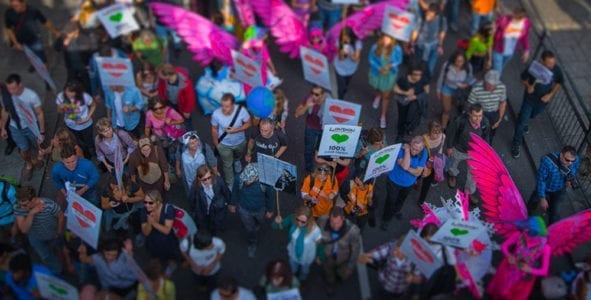Why some cities are ‘rebel cities’ – interview with Yaz Brien about Bristol’s resistance scene
Grassroots activism is widely considered a vital element in society’s shift to becoming more just and ecologically balanced. What is it about certain places/cities that makes them more conducive to the emergence and sustainability of environmental activism? (This blog first appeared on the openDemocracy website, 17 Oct 2018).
Grassroots activism is widely considered a vital element in society’s shift to becoming more just and ecologically balanced. However, it is clear that in some places, movements are more active than in others. What is it about certain places/cities that makes them more conducive to the emergence and sustainability of environmental activism?
To address this question, our CUSP research at Keele University compared two British cities: Manchester and Bristol. Both have a long tradition of environmental activism and still provide fertile grounds for the development of grassroots solutions to environmental crises, such as projects around food and energy.
But while Manchester has in recent years seen a sharp decline in resistance-oriented environmental activism (protest, civil disobedience, direct action), Bristol has, despite some decline, maintained a more vibrant resistance scene. To understand why activism can develop so differently in two cities with comparable histories and challenges, we spoke to 43 activists in both cities.
One of them was Yaz Brien, an experienced Bristol-based activist who, since 2006, has seen activism develop in Bristol through their involvement in groups like No Borders, Rising Tide, Camp for Climate Action, Bristol Queercaf, and the Kebele social centre (now BASE).
In late 2017 and early 2018, I travelled to Bristol several times to get a feeling of its famous alternative scene and to interview environmental activists. Unfortunately, I never managed to meet up with Yaz, so we arranged an interview through Skype. I began by explaining that, in order to make sense of the seeming disappearance of environmental resistance in Manchester, we wanted to know about environmental activism in Bristol.
Their insightful account of events clearly depicts some of the differences between Bristol and Manchester that we found to be most decisive. Moreover, their account revealed not only the societal pressures that currently make (environmental) activism in the UK that much harder, but also the coping mechanisms and urban qualities most decisive in allowing the Bristolian social movement scene to keep going.
Joost de Moore (JM): According to many activists we have spoken to, Bristol has remained an important hub for environmental resistance in the UK. Why do you think that is?
Yaz Brien (YB): I sometimes think that Bristol’s reputation of “if anywhere is having it, then Bristol is having it” is bigger than the reality. Some of what you’ve described about Manchester we’ve seen happen here in this city as well.
My relationship to being almost daily in struggle shifted a few years ago and I think that was around the same time that a lot of things shifted for people here in Bristol. There’s a direct connection and correlation with the state repression that was happening here in the city, and a lot of us were quite directly affected by that.
I haven’t gone into food growing or the land-based movements but a lot of my peers have. The fact that I haven’t is partly located in my identity as a working-class person, a person of colour, queer. That white hippie end of things was never really my interest. My interest was in relating to those bigger, wider structural issues around climate justice, talking about environmental racism for example, not simply talking about how can we do our energy better.
These days, I guess I’ve reached an age where you’re an elder, a kind of Anarchist Yellow Pages – a connector of younger folk with older folk. A lot of young newcomers or activists get in touch wanting advice or to bounce ideas.
JM: So, on the one hand, there is a decline in radical action in Bristol just like in Manchester, but on the other hand, there are still exceptions?
YB: Yeah. For instance, Rising Tide has stayed consistently in the city for many years, continuing to do direct action. They still go and shut shit down like pretty regularly and are really involved in a lot of anti-coal, anti-fracking stuff, walking that line between very accessible movement building and “we will shut down the means of this production.”
And it’s really nice that some of those people are also involved in local community projects and food and land projects, but have very much maintained the idea that we have to shut stuff down and talk about what the alternatives are.
I sometimes think talking about the alternatives is about how you then deal with the media and how you do mass mobilisation. Normal people need to know that we’re looking at the future and not just saying that what we’ve got right now is bad. We’re building towards something, to inspire people into action. But that’s also why environmental activism can end up becoming quite liberal because people with more liberal ideas become inspired, and then just go down the route of ‘Well, maybe nuclear isn’t so bad after all, you know?’ We’ve seen climate camps where there have been debates with people saying, “Well maybe nuclear is better than coal”. That position doesn’t have a decolonisation angle. People don’t ask, “Where’s the extraction happening that enables us to have uranium?”
Still, we’ve seen a struggle around really rare Grade 1 arable land on the outskirts of the city. The council tore it up to put in an extra road for a bus service that isn’t actually going to have any environmentally positive impact on the city. There was an interesting eruption of liberals involved in growing projects and people occupying that space, occupying those trees and doing much more forceful resistance. And I guess that was a beautiful Bristol moment. These two communities are kind of distinct but they will work together for a struggle like this.
JM: So, are groups like Rising Tide still active because people who’ve been involved in it for a long time have managed to sustain their activism, or are they also good at attracting new younger participants?
YB: It’s a bit of both really. There are definitely people within Rising Tide and within Reclaim the Power who’ve been in this struggle for a really long time. It does test them and it does sometimes have an impact on them. It’s very hard to sustain activism generally, because we’re all still trying to pay our rent and pay our bills at the same time, and you know, the economic situation around us makes it even harder to invest the amount of time and energy that we would want into our actions. But I do think they have also been able to bring new people in and sustain groups. If I look at some of the political and activist groups that have existed in Bristol, they are maybe less dysfunctional than some groups I’ve seen elsewhere. They do communication well. It’s not just lots of very macho men that are involved. It’s a movement that shuts shit down but it really isn’t kind of hypermasculine. And I think, in many ways, that is a factor in its sustainability.
JM: Why do you think sustaining activism in Bristol seems to work better than in some other places?
YB: Bristol has got a long history and tradition of activism, longer than I’ve been in the city. I’ve been here maybe 12 years now and I knew of Bristol in the late ‘90s as a city that was on my radar because people were doing the kind of politics that I was interested in.
So, I think it’s always drawn a disproportionate number of actively engaged people compared to a lot of cities. We have an anarchist social centre here that has been going since the mid to late ‘90s and hasn’t been under the same pressures as in some other cities. The community owns that building, so we have a constant space that we can use to do things. It takes effort to do that, but it has acted over the years as a hub and it is still a hub that attracts people. People go there for Sunday dinner and a community meal and then that’s the kind of space where films and talks and events can happen.
In other cities, they’ve not necessarily had those permanent hubs that people would be drawn. Either that or they need to be constantly defended. You know, we’ve never had to pay a lease. We’ve never had to sell alcohol to each other to fund it. We now own the building outright. And so, the energy isn’t being taken away. We’ve got good infrastructure in place and we have good key people who know how that infrastructure works and who’ve also been involved nationally and internationally and have an interest not only in the doing, but in the processes behind that – you know – good facilitation skills, good consensus decision-making skills, good security skills. They’re key. I think infrastructure is really key and that’s also about knowledge, sharing that knowledge, and spaces that things can happen in.
Moreover, the city itself is bigger, but the city that a lot of activists dwell in is tiny. Everyone is less than six degrees of separation to everyone. You think you’ve met somebody completely new and then you realise that they’re already connected to you.
It’s easy to get around, you can cycle everywhere. So, if something’s happening over here or an event over there, we can get there. And we see each other physically on a day-to-day basis even if we don’t intend to, so there’s a lot of informal spaces where stuff happens.
It means that you don’t always have to be at the meeting or go to the event. And I just think there’s something about the physicality of this city, its shape, its size and the fact that it’s a nice city to live in, that creates that energy.
I really like Manchester as a city, but it’s big. I grew up in Birmingham. They’re just like heavier, harsher, industrial cities. We can take care of ourselves maybe a little bit better than we would in some places and we can maintain connection informally a lot easier.
I feel like I’m out of the game in lots of ways, but I still know everyone and I still know what’s going on, and I still connect people up because there are spaces for that. Your socialising is political here. You just go to the pub and you bump into loads of people and inadvertently shit happens.
JM: Because of this, it seems, Bristol has come to attract a lot of activists from across the UK. Is that a good or a bad thing?
YB: I used to criticise everyone wanting to come to Bristol because Bristol was de-skilling other parts of the UK. We had infrastructure in place and active groups and a ‘do it’ attitude. And I was always concerned that eventually Bristol would kind of implode, you know – something just gets bigger and stronger and more powerful. Could we even sustain that as a city? And I felt that it was having an impact across the country. I wanted there instead to be these levels of energy and infrastructure and connection and networking happening nationally, so that we networked and supported each other nationally, but that people didn’t just keep showing up here.
Now, I think there’s other factors at play that mean that Bristol isn’t doing what it was doing, say, eight years ago. If you compare what’s going on nationally, we probably are still pretty active. But I also see that when the Tories came into government and the policies of austerity really started to hit, that threw up questions that maybe we couldn’t answer.
It required a kind of politics and an organisation that maybe we couldn’t rise to, and that left a lot of individual people really questioning, what is it that we’re doing, what is important? We’re definitely seeing around us a city that’s increasingly unaffordable for people to live in. The impact of squatting legislation has really changed this city and meant that younger people wanting to get involved in activism are struggling to do so because, as I mentioned before, we’ve all got bills and rent to pay. So it’s getting harder and harder, especially when we had such a climate of repression as well and state surveillance and infiltration – all of that. It’s a hard life to encourage people to take on.
JM: To the extent that there is still radical activism, are there specific coping mechanisms that make this possible?
YB: That’s often about the energy of a small group of individuals who can be consistent and who at some point in their lives decided that they’ll really hold on to prioritizing activism. And that includes not settling down into quite heteronormative lifestyles. They might be in relationships and they might even have got married, but they’re not just living in couples. There’s a lot of people still living collectively or in housing co-ops. I think not having children keeps a generation involved in politics. So, it’s about the choices some individuals have made. And environmental and animal-right activism has really long historical traditions that have helped keep that foundation in place.
Currently there’s new growth and new roots that are definitely coming through. But we went from having all of the things in place to very little happening. Because when people are first drawn to the city, there’s this excitement and this kind of youth rebellion which is amazing. But people don’t always recognise the hard, boring work that goes on in sustaining community, networks and infrastructure.
I used to say to people: “my activism now is like an anarchist infrastructure”. And I think there’s a lot in that, if we’re talking about this overarching theme of sustainability. I tried to set up a local kind of activist trauma support group because there was a lot of fucking trauma going on: when people are in very frontline positions, when you know that you are under surveillance, when you know that you have been infiltrated and probably are still being infiltrated, when you have been hurt by the police or when you haven’t managed your adrenaline comedown after an action that went excitingly well. I see younger folks in Bristol right now who have organised a space in a local community café for activists to come together once a week and talk about how that feels and how that’s impacting on them. So, I can see that the younger folks are really recognising that that’s something really key to the work that we’re all doing.
JM: Given some of the challenges and strengths you’ve described, how do you see the future for activism in Bristol?
YB: I have always been really aware of the role of queers, artists, and anarchists in gentrification. Like we’ll come into spaces, we’ll squat them, we’ll make stuff happen and we make them cool and then they’re marketable. Bristol very much has a brand that it trades off and that brand was developed by the countercultures that exist here, not just politically but through music, the arts and culture. It’s like massively gentrified now. Because we made the city exciting, it made people want to be here.
Now, people in a lower socioeconomic bracket are increasingly moving out. The neighbourhood I live in, where the Kebele Social Centre is, will become increasingly hard to use as a space, because people don’t live in this neighbourhood any more. We all used to live within a few streets of each other. The new housing co-ops that were forming to try and create sustainable housing can’t afford to be in this neighbourhood: they’re moving out.
So, if people can’t afford to be here, then we’re going to lose that energy. I’ve always wanted there to be other hubs across the country. I thought as a UK movement we would be more sustainable if we could nurture other hubs. And so, I think this city has been a good testing ground. If that energy were to move elsewhere, that wouldn’t be bad for UK politics. I’d just be kind of sad, because I like being in that hub and I like the community that I developed, but that’s just a very personal thing. Still, I think there’s something very particular to here that, if it were gone, would be a loss.




